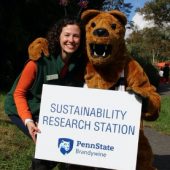
Abstract: In Fall 2017, Penn State Brandywine kicked off an initiative titled Sustainovation, emphasizing programming and community collaborations through sustainability and innovation. The campus identified Tyler Arboretum as a community partner to work with to assist in advancing their education and outreach goals. Students from across the campus came together at the beginning of the semester for an initial meeting to be introduced to the United Nations Sustainable Development Goals (SDGs), to meet the community partner and to hear about the semester project of adding sustainability education to the arboretum’s fall festival Pumpkin Days. In addition, a validated survey from Biasutti & Frate (2017) was given to the students to define their attitudes towards sustainable development before working with this partner and the project. The survey addresses four sustainability constructs of Environment, Economy, Society, and Education. At the end of the semester, the same survey was given to student participants in this Sustainovation project for Tyler Arboretum. Aggregate data show that there is a statistically significant difference in student attitudes at a minimum 90% confidence level (t-test) for eight of the twenty survey statements in the constructs of Environment, Economy, and Society.
Continue ReadingAbstract: With apparel and textile production finding itself a leader in social and environmental responsibility issues, the call to action to influence purchase intention for sustainable and responsible apparel is necessary to both the environment and humankind. Literature supports the connection between consumer knowledge of social issues within the apparel and textile industry and purchase behavior. Cowan and Kinley (2014) identify attitudes as the strongest predictor for purchasing environmentally sustainable apparel. This study looks at the interjection of a type of popular and accepted medium, film, as a possible catalyst to knowledge and attitude change in millennial consumers regarding responsible apparel. This is an exploratory quantitative research study to explore possible future directions of how to impact sustainable purchase intentions of millennials in a consumer driven society. A total of 128 participants from a large Midwest university took part in the study during spring and fall 2016. This study found that millennial consumers had significant change in their purchasing behavior regarding responsible apparel. They also considered themselves more knowledgeable regarding the topic. However, their change in attitudes was not towards being more concerned with what was happening in the industry nor their willingness to sacrifice price and style for responsible apparel.
Continue ReadingAbstract: The research coordination network (RCN) – Climate, Energy, Environment and Engagement in Semiarid Regions (CE3SAR) is a NSF funded five-year project (2012 to 2016, extend to 2017). One goal of the RCN CE3SAR project is to enhance sustainability education in South Texas. To achieve this goal, the RCN CE3SAR steering committee adopted two strategies: creating learning objects and supporting open education. This article reports the process and methods of creating and publishing RCN CE3SAR sustainability learning objects as open education resources.
Continue ReadingAbstract
The study assesses the extent to which curriculum of secondary schools in Tanzania addresses sustainable education through integration of environmental education. Specifically, it evaluates the subjects used to deliver environmental education in secondary school. Also the study found out perceptions, challenges, and recommendations for implementing environmental education. This research adopted a case study, qualitative approach to study the subject matter in its natural settings while making sense of the contents of the subjects and perceptions of stakeholders. Cross sectional, stratified sampling involved both students from all classes, experienced teachers in geography and biology and a head teacher as well. It was found that most environmental education competencies are delivered mainly through the geography subject, and some in biology using an integrated teaching approach. Students and teachers were fairly knowledgeable and had understanding of basic environmental issues. Main challenges facing implementation of environmental education included an integrated learning approach, inadequate knowledge on environmental education, lack of support from each other and from school administration, and cultural myths and beliefs.
Abstract: This essay offers reflection on the question of what love has to do with sustainability and environmental awareness. Examining Terry Tempest Williams’ Desert Quartet, Aldo Leopold’s A Sand County Almanac and Pattiann Rogers’ Firekeeper: New and Selected Poems, the article explores how and when environmental consciousness arises. The three selected authors offer insight on the roles played by environmental trauma, close and empathetic identification with animals and place, the power of close observation, and the constitutive power of praise. Finally, an etymological reading of the word, “sustain,” suggests new definitions of what it means to have and to hold, to make a pledge to environmental awareness. The essay concludes that the vocabulary and emotional commitment prompted in acts of sustainability partakes in the language of love.
Continue Reading
This article presents a case study of a collaborative project between the energy manager and a sociology professor at a small liberal arts college. Introductory sociology students designed and disseminated a survey on energy use at the college and found a disconnect between attitudes and behavior in energy use. While these results were not surprising, this exercise allowed the students to not only learn research methods but students also reported an increasing awareness of their own knowledge and practices in using energy. We believe this type of exercise, using one’s disciplinary methods with an engaged learning project, would be a useful vehicle for teaching sustainability in a variety of disciplines not normally associated with the environment or sustainability.
Continue Reading
Two developing strands of a multidisciplinary literature provided an impetus for this paper: 1) the emergence of new regionalism, new urbanism, and smart codes that inform urban planning and design principles and practices for environmental sustainability, and 2) the diffusion of telecommunication and multi-media technologies that facilitate implementation of pedagogic principles in the “classroom.” The emerging urban planning and design paradigms anchor environmental sustainability issues firmly in place and space with an emphasis on the physical form of cities and regions, which, due to induced vehicular travel, is linked to greenhouse gases with consequences for climate change. Innovations that enhance learning in the classroom or the community increasingly embed and diffuse telecommunication and multimedia technologies. The intersections of urban sustainability, planning, pedagogy, and technology are briefly reviewed in this paper. It turns out that urban planning and design paradigms—particularly those with an emphasis on systemic knowledge, holistic views of both the natural and built environments, collaboration, communication, and reflective practice—synergize with environmental sustainability goals. Furthermore, these very features are ingredients for effective education for urban sustainability, particularly in conjunction with advanced telecommunication and multimedia technologies.
Continue Reading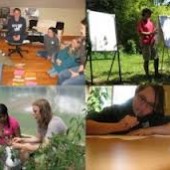
To live up to UNESCO’s definition of a sustainable development education that empowers youth with the knowledge, attitudes, motivations, commitments, and skills to solve and prevent the world’s total environmental problems, youth must be able to find meaning in the curriculum based in their own experiences and expanded through shared group experiences. An environmental-based experiential curriculum with a positive development focus can help youth reclaim their learning process and reconnect with their communities. However, without critical analysis, students, especially marginalized students, cannot develop the tools and competencies to truly understand their environment and their place within it. Linking environmental and experiential education with critical theory provides students the opportunity to develop their leadership and gain the social and cultural literacy skills needed to come in from the margins.
Continue Reading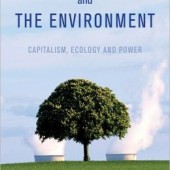
Tina Evans explores the multi-faceted significance of this book about the many different ways we must consider the role of power in the process of globalization. Her review gives us a taste of how broadly Newell defines governance and sees the role of power among state and non-state institutions at many different levels. The relationships among business, governments, trade, finance, capital and the environment all enter into the overview of this important work provided by Evans.
Continue Reading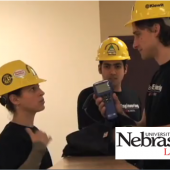
As we continue into the future, if we hope to move in the direction of sustainability, the question of energy efficiency in buildings old and new becomes increasingly relevant and key to success. Read this article by Dr. Terri Norton and Matija Ratovic to learn about efforts I the Midwest to prepare university students to take on this task.
Continue Reading
Decent life depends on nature’s provision of stable resources. In this report I explore cultural efforts embedded within nature preservation and environmental education among the indigenous Baganda and how these can be emulated to inform modern environment conservation programmes. Accordingly, environmental conservation in Buganda was guided by clearly streamlined gender roles and cultural values through spirituality and the clan system which defined the ethical relationships between human culture and the environment. The key challenges towards this include gender inequality and the associated stereotypes, the political climate in the country, and modern religions. Successful mitigations should essentially hinge on integrating indigenous conservation methods in formal school curriculum as well as undertaking sensitization and empowerment campaigns geared towards nature preservation.
Continue Reading
Timothy Clayton looks at the internal workings of NPO’s (New Paradigm Organizations) to see how they might respond to the experiences of operating in a world structured by capitalism and traditional business practices. His insights produce an impressive and thoughtful list of ways in which some NPO’s, despite a flashy mission statement, might not practice what they preach, and can fall into traditional modes of operation.
This essay explores the challenges facing organizations intent on fostering peace, justice, and sustainability when incorporating traditional business practices into their operational modeling. The implications of these practices on internal organizational community conditions are examined, as are the possible impacts on mission-intended transformational capacities.
Continue Reading
Whoever would study medicine aright must learn of the following subjects. First he must consider the effect of the seasons of the year and the differences between them. Secondly he must study the warm and the cold winds, both those which are in common to every country and those peculiar to a particular locality. Lastly, […]
Continue Reading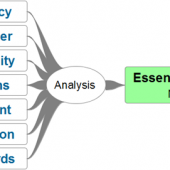
Bryan Nichols calls out to JSE readership to get involved in defining what essential ecoliteracy includes. His comprehensive, interactive methodology has worked from a literature search-and-survey analysis to create a mind-map of the domains and components of essential ecoliteracy. Readers can find out more here; then play with the mind-map online and send Nichols an online or print survey.
Continue Reading